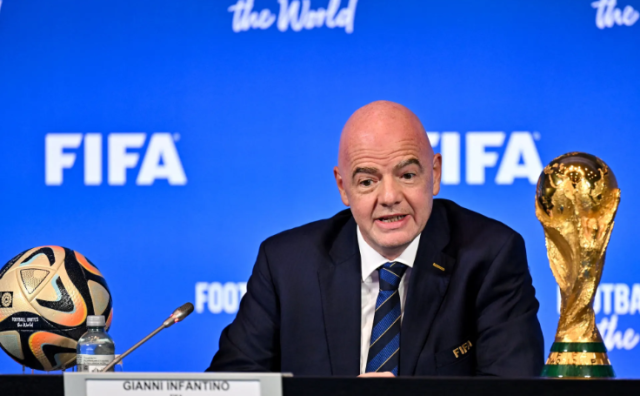The 2030 FIFA World Cup will be hosted in three continents as dozens of football teams and hordes of fans will move around the globe for matches.
An announcement on the 2030 and 2034 World Cups will be made on Wednesday, according to FIFA.
While Saudi Arabia is a lone host for 2034, Morocco, Spain and Portugal have formed a joint bid for the 2030 tournament, with Uruguay, Argentina and Paraguay each also set to host a match.
Guillaume Gouze, of the Centre of Sports Law and Economics at the University of Limoges, said FIFA has a “moral responsibility to integrate climate concerns into its tournament plans."
Reacting, the NGO Carbon Market Watch, Benjamin Faecks said that the 2030 tournament was “an unfortunate geographic choice”.
When an event is spread over sites thousands of kilometres apart, teams and potentially hundreds of thousands of their loyal fans have to travel by plane.
The three matches in Argentina, Uruguay and Paraguay are to mark the 100th anniversary of the event, which was born in Montevideo.
According to an official researcher at the University of Lausanne in Switzerland, David Gogishvili, "FIFA is keen to support access to football across different parts of the world but it is a crazy idea in terms of the impact this choice will have on the planet”, he added.
FIFA has already expanded participation in the competition, which will see 48 teams take part in the 2026 edition — held in Mexico, the United States and Canada — compared to 32 in 2022.
This “is almost worse than the Cup on three continents,” says Aurelien Francois, who teaches sports management at the University of Rouen in France.
FIFA says that, with the exception of the games in Argentina, Uruguay and Paraguay “for 101 games, the tournament will be played in a footprint of neighbouring countries in close geographic proximity and with extensive and well developed transport links and infrastructure”.
Recall that the 2022 World Cup was held in a “compact” site in Qatar, it was necessary to build new air-conditioned stadiums that were rarely reused.
Potential improvements could include a policy of not awarding the World Cup to a city where everything has yet to be built, echoing a rule by the International Olympic Committee, said Gogishvili.
Fans raise concern over environmental issues
Soccer fans are a reflection of the population as a whole, so a growing percentage are more environmentally conscious than even a few years ago, said Ronan Evain of Hamburg-based Football Supporters Europe.
He said that while co-hosting is not a problem in and of itself, citing the example of the 2002 Cup co-hosted by Japan and South Korea, the 2030 tournament poses “too many questions” for fans.
These include the environmental costs, as well as financial considerations for fans trying to follow their teams across the planet.
But die-hard supporters will not let the long-haul flight put them off, said Antoine Miche, director of Football Ecologie France as “Passion can make you do things that don’t make sense,” he added.




















